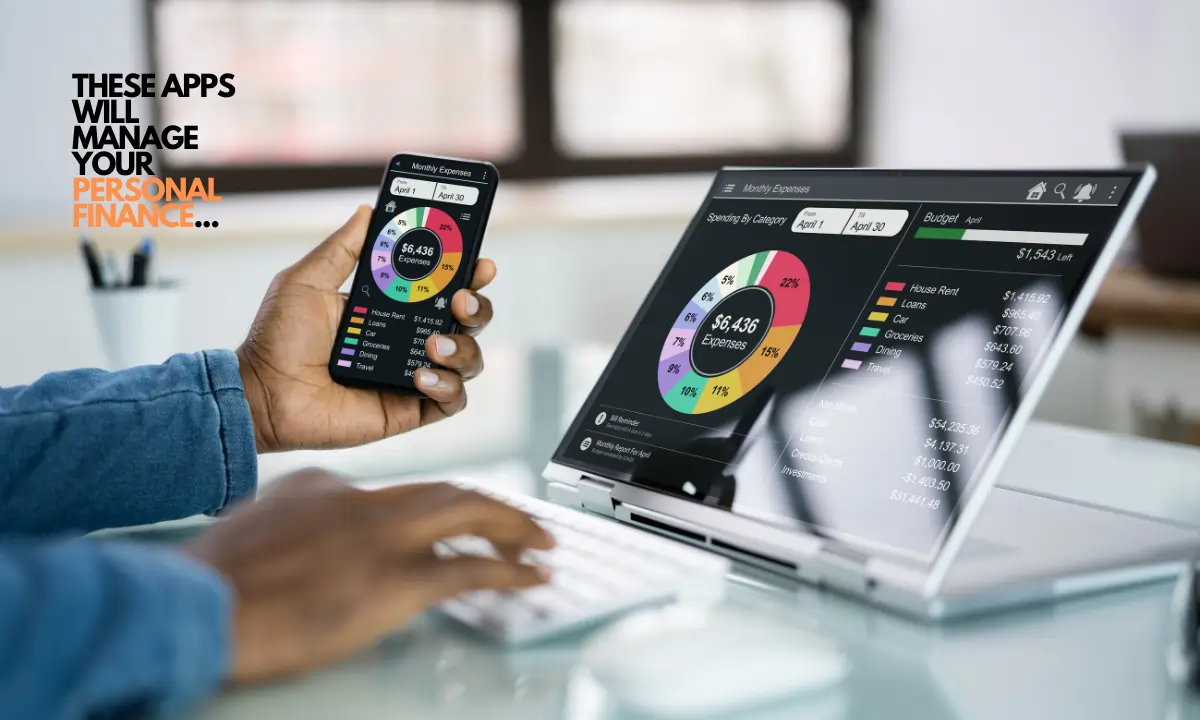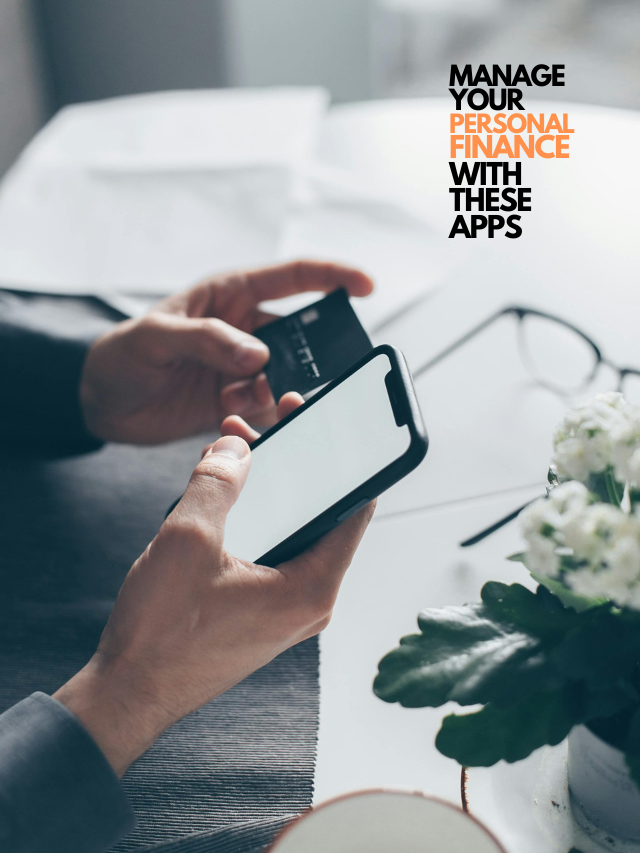What is personal finance?
The concept of personal finance is related to the management of your income, spending, saving investing and protection (five areas) to achieve your financial goals. It is solely about making proper decisions on how a person can use their money to meet current and future needs.
Top apps that a person can rely on to manage their personal finance
The role of fintech and financial apps in this context is critical as technological advancements have transformed personal finance. Today, apps help users monitor their income, control spending, and invest with a thoughtful mind. The article explores the 6 most useful apps for personal finance management, highlighting their special features and personalisation.
Mint: Budgeting and Expense Tracking
Mint is one of the most used personal finance apps, and this app syncs well with all your bank accounts, credit cards as well as investments into one dashboard. This is important because it allows one to have a holistic view of your finances. The app categorises expenses, helps stick to a budget and tracks credit scores. With its alerts, people can stay on top of bills and payments.
YNAB: personalised budgeting
YNAB is the short form of You Need A Budget. This budgeting app is popular among users who follow a strict budgeting strategy. The app is designed to help users plan every dollar, where they can ensure that each one is allocated to a specific purpose, be it related to bills, savings or debt payment. The app is known for its supportive budgeting philosophy, as it focuses on giving every dollar a job. As per the app’s latest updates, it offers customisation and goal-setting features.
PocketGuard
PocketGuard is known for spending analysis and savings. This app offers an intuitive interface that helps users track their spending and further allows them to see how much money they have left after covering bills or other expenses. PocketGuard categorises spending habits and identifies areas where users can save.
Axio: Expense Tracker & Budget
Axio, formerly Walnut, is an SMS-based money investment app. For those interested in wealth building and investments, this app is one of the greatest apps. Axio helps with budgeting and tracks all investments comfortably. Its comprehensive tools allow users to track their network, plan for retirement as well as analyse their investment portfolio, which is important to understand the full picture of personal finance and financial health.
Emma: Budget Planner Tracker
Emma is also an intuitive personal finance app, and it is designed to help users manage all their accounts in one place. The app is helpful in identifying subscription costs, tracking debt, and monitoring daily expenses. Its simplicity and its insightful analytics make the app ideal for users who need a way to manage their finances.
Goodbudget: envelope budgeting
Goodbudget takes inspiration from the envelope budgeting system, where users allocate a set amount of money into envelopes. It is designated for specific expenses. The app lets individuals divide their income into virtual envelopes, which makes it easier to see where money is going. It is perfect for people who want to stick to a zero-based budgeting system.
| Rank | App | Features | Link to download | Personalisation and suitability |
| 1. | YNAB | Goal-focused budgeting Zero-based budgeting approach Syncs with multiple devices Real-time expense tracking and report generation | https://play.google.com/store/apps/details?id=com.youneedabudget.evergreen.app&hl=en_IN | Best for detail-oriented users who need comprehensive budgeting systems and are comfortable with a structured approach. |
| 2. | Mint | All-in-one financial overview Bill tracking and payment alerts Credit score monitoring Custom spending categories | https://play.google.com/store/apps/details?id=com.htmedia.mint&hl=en_IN | Ideal for users looking for a free app that offers a full overview of their finances with strong automation and simplicity. |
| 3. | PocketGuard | Automatic budget creation “In My Pocket” feature for saving suggestions Connects to all financial accounts Subscription tracking | https://play.google.com/store/apps/details?id=com.pocketguard.android.app&hl=en_IN | Suitable for users seeking to control overspending and track subscriptions effortlessly. |
| 4. | Goodbudget | Envelope budgeting system Manual expense tracking Syncs across devices for households Debt tracking | https://play.google.com/store/apps/details?id=com.dayspringtech.envelopes&hl=en_IN | Perfect for couples or families using the envelope budgeting system for shared finances and cash flow management. |
| 5. | Emma | Categorises spending Subscription tracking Detects wasteful spending Supports multiple accounts | https://play.google.com/store/apps/details?id=com.emmaprod&hl=en_IN | Best for millennials and those looking to optimise subscriptions and track multiple financial accounts. |
| 6. | Axio | Simple budgeting tools Secure data encryption Focus on expense tracking | https://play.google.com/store/apps/details?id=com.daamitt.walnut.app&hl=en_IN | Great for users focused on privacy and simplicity in tracking daily expenses without complex features. |
What is the importance of personal finance?
Financial independence and freedom: Sound personal finance management gives individuals financial independence. It is personally important to make life decisions without financial stress, whether it is switching jobs, pursuing education or buying a home.
Meeting financial goals: Personal finance helps individuals plan and achieve their goals with respect to personal finance, both short-term i.e. buying a car and long-term like planning for retirement. With your focus on budget savings and making wise investment decisions, you can accumulate the wealth that is required to reach them.
Managing debt responsibly: Effective financial planning, is helpful for users to go above the trap of mounting debts and paying interest on loans. The significance is also related to managing credit card bills without falling behind. Good personal finance means borrowing responsibly and having a proper plan to pay off debts.
Emergency preparedness: Life is unpredictable, and nobody knows what is going to happen at the next minute. So personal finance helps individuals prepare for emergencies by building an emergency fund for unforeseen expenses. These can be medical issues or car repairs that are important to stay afloat.
What are the strategies of personal finance?
Budgeting
A budget is the foundation of personal finance since it helps individuals track income and expenses, which is vital to ensure that spending does not exceed income. A 50/30/20 rule is a common budgeting rule. This means 50 per cent of income goes to necessities, 30 per cent to discretionary spending and 20 per cent to savings or debt repayment.
Building an emergency fund
An emergency fund is that provide a financial cushion for users for their unexpected expenses. These can be medical bills, car repairs and losing job. In this case, financial experts comes in handy, as they recommend savings of 3 to 6 months’’ worth of living charges. Moreover, setting up automatic transfers to a separate savings account helps ensure that emergency funds are replenished.
Managing debt
The debt snowball method is an approach that focuses on paying off smaller debts first. This is effective in building momentum and motivation before jumping into larger debts. The dent avalanche method is also an approach where individuals focus on paying off debts. Here the interest rates are higher. It is useful to reduce the amount paid in interest over time. Consolidating debt combines multiple debts into one loan. This can be paid off with lower interest rate and is vital to simplify payments and reduce the total cost of debt payments.
Saving for retirement
Individuals can seek the benefits of employer-sponsored retirement plans. There are plans in this category, for example the individual retirement accounts and 401(k)s, aiming to save for the future.
The other strategies for personal finance are – investing wisely, tax planning, insurance and risk management, and also setting financial goals, focusing on the short-term and long-term benefits.
FAQ
What is personal finance?
Personal finance is the management of your income, spending, saving, investing, and protecting your financial assets to meet both current and future financial goals.
Why is personal finance important?
Personal finance helps achieve financial independence, manage debts, meet long-term and short-term goals, and prepares for emergencies by building financial security.
What are the top personal finance apps?
The top personal finance apps are YNAB, Mint, PocketGuard, Goodbudget, Emma, and Axio, each offering unique features to manage budgeting, expenses, and savings.
What is the 50/30/20 budgeting rule?
The 50/30/20 rule allocates 50% of income to necessities, 30% to discretionary spending, and 20% to savings or debt repayment, creating a balanced personal finance structure.
How do the snowball and avalanche methods help in debt management?
The snowball method focuses on paying off smaller debts first to build momentum, while the avalanche method targets debts with the highest interest rates to reduce overall costs.
What is the purpose of an emergency fund?
An emergency fund provides a financial safety net for unexpected expenses such as medical bills, car repairs, or job loss. It is recommended to save 3 to 6 months of living expenses.
How do apps like Mint and YNAB differ in managing personal finances?
Mint provides a holistic financial overview, categorizes expenses, and tracks credit scores, while YNAB offers a goal-focused, zero-based budgeting approach for strict budget management.
How does PocketGuard help control spending?
PocketGuard categorizes spending habits, tracks subscriptions, and shows how much money is left after covering bills and expenses to help control overspending.
What should I focus on when saving for retirement?
It is essential to contribute to employer-sponsored retirement plans, such as 401(k), and set aside funds for long-term retirement goals by investing in tax-advantaged accounts.
Why is setting financial goals important in personal finance?
Setting financial goals ensures that you have a roadmap to achieve both short-term objectives like buying a car and long-term goals like retirement, helping accumulate wealth strategically.



